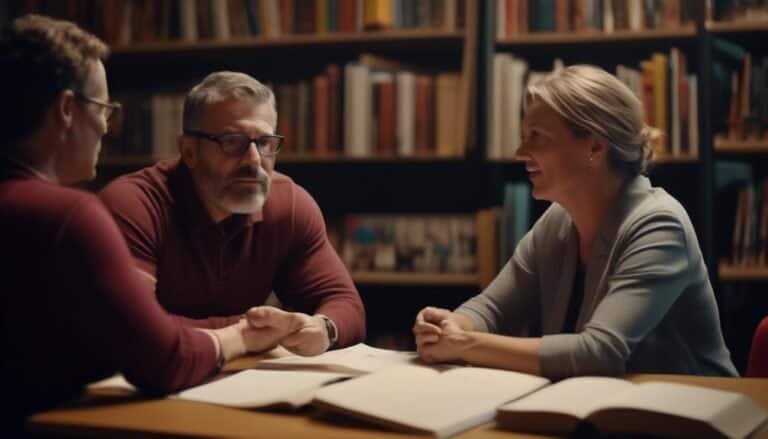What Is Conflict Coaching?
Have you ever found yourself caught in the middle of a heated argument, unsure of how to navigate the conflicting emotions and opinions? Conflict coaching might just be the solution you've been searching for.
This unique approach to conflict resolution offers a structured and supportive process that empowers individuals to effectively manage and resolve conflicts in their personal and professional lives.
But what exactly is conflict coaching, and how does it work? Let's explore this intriguing concept together, as we uncover the key principles, benefits, and techniques that make conflict coaching a valuable tool in fostering healthier and more harmonious relationships.
Key Takeaways
- Conflict coaching is a process that helps individuals manage and resolve conflicts effectively.
- The primary goal of conflict coaching is to empower individuals to handle conflicts by improving their communication skills, understanding their conflict style, and managing their emotions.
- Conflict coaching provides benefits such as clarity and perspective on conflicts, a safe environment to express thoughts and emotions, improved relationships and communication skills, increased self-awareness, and enhanced problem-solving skills.
- Conflict coaching involves a trained coach guiding individuals or teams through a structured process, utilizing coaching techniques and conflict resolution strategies.
Definition of Conflict Coaching
Conflict coaching is a process that aims to assist individuals in effectively managing and resolving conflicts by providing them with guidance and support. Conflict coaching can be defined as a one-on-one professional relationship between a coach and a client, where the coach helps the client navigate through conflict situations and develop strategies for resolution.
The primary goal of conflict coaching is to empower individuals to effectively handle conflicts in their personal and professional lives. It provides individuals with the necessary tools and skills to address conflicts proactively and constructively. By working with a conflict coach, individuals can gain a better understanding of their own conflict style, develop better communication skills, and learn how to manage their emotions during conflict situations.
There are several benefits of conflict coaching. Firstly, it helps individuals gain clarity and perspective on the conflict they're facing. Through open and honest conversations with the coach, individuals can gain insights into the underlying causes of the conflict and identify possible solutions.
Secondly, conflict coaching provides a safe and supportive environment for individuals to express their thoughts and emotions. The coach acts as a neutral party who listens without judgment and offers guidance and feedback.
Lastly, conflict coaching can improve relationships and enhance communication skills. By learning effective conflict resolution strategies, individuals can build stronger relationships based on trust, respect, and open communication.
Benefits of Conflict Coaching
After gaining clarity and perspective on the conflict you are facing through open and honest conversations with a conflict coach, you can now explore the numerous benefits of conflict coaching. Conflict coaching offers a range of advantages that can help you navigate and resolve conflicts more effectively. Here are some key benefits:
| Benefits | Success Stories |
|---|---|
| Improved Communication Skills | A client was able to improve their communication with their partner, leading to a more harmonious relationship. |
| Enhanced Conflict Resolution Strategies | An employee learned new strategies for resolving conflicts with colleagues, resulting in improved teamwork and productivity. |
| Increased Self-Awareness | Through conflict coaching, an individual gained insight into their own triggers and reactions, allowing them to better manage their emotions during conflicts. |
| Enhanced Problem-Solving Skills | A team member developed stronger problem-solving skills, enabling them to find creative solutions to complex conflicts within the organization. |
| Improved Relationships | Conflict coaching helped a client repair and strengthen their relationships with family members, leading to greater harmony and understanding. |
| Increased Confidence | A participant in conflict coaching gained confidence in their ability to handle conflicts, leading to a more assertive and empowered approach in their personal and professional life. |
These success stories highlight the tangible benefits of conflict coaching. By investing in conflict coaching, individuals and organizations can develop the skills and mindset necessary for effective conflict resolution, leading to improved relationships, enhanced communication, and overall success.
How Conflict Coaching Works
To understand how conflict coaching works, let's start with an overview of the coaching process.
In conflict coaching, a trained coach helps individuals or teams navigate through their conflicts and find resolutions. The coach plays a crucial role in guiding the conversation, asking probing questions, and facilitating open communication.
Additionally, conflict coaching involves teaching participants various conflict resolution strategies to effectively address their issues and move towards a positive outcome.
Coaching Process Overview
When engaging in conflict coaching, individuals can expect a structured process that focuses on facilitating effective communication and resolution strategies. Conflict coaching typically follows these steps:
- Assessment: The conflict coach will assess the situation and gather information about the conflict, including the parties involved, their perspectives, and their desired outcomes.
- Goal setting: Together with the individual seeking coaching, the conflict coach will establish specific goals and outcomes to work towards during the coaching process.
- Coaching techniques and conflict resolution methods: The conflict coach will employ various coaching techniques and conflict resolution methods to help the individual develop effective communication skills, explore different perspectives, and find mutually beneficial solutions.
Throughout the coaching process, the conflict coach provides guidance, support, and feedback to help the individual navigate the conflict and develop strategies for resolution. The ultimate goal is to empower the individual to effectively manage and resolve conflicts in their personal or professional life.
Role of the Coach
As the conflict coaching process unfolds, the role of the coach becomes pivotal in guiding individuals towards effective communication and resolution strategies.
The coach employs various coaching techniques and conflict coaching models to assist clients in navigating their conflicts. By actively listening and asking thought-provoking questions, the coach helps clients gain insights into their conflicts and identify their underlying needs and interests.
The coach also facilitates the development of communication skills, such as active listening, assertiveness, and empathy, to enhance clients' ability to express themselves and understand others.
Additionally, the coach supports clients in exploring different perspectives and generating creative solutions. Through their guidance and expertise, coaches empower individuals to take ownership of their conflicts and work towards mutually beneficial outcomes.
Conflict Resolution Strategies
Conflict coaching works by providing individuals with the necessary tools and guidance to effectively address and resolve their conflicts. Through conflict resolution techniques and conflict management strategies, individuals can gain a deeper understanding of their conflicts and learn how to navigate them in a constructive and productive manner.
Here are three key strategies commonly used in conflict coaching:
- Active Listening: Active listening involves fully focusing on what the other person is saying, without interrupting or judging. It helps create a safe and empathetic space for open communication.
- Collaborative Problem-Solving: This strategy involves working together with the other party to find mutually beneficial solutions. It encourages brainstorming, compromise, and finding common ground.
- Assertiveness and Communication Skills: Conflict coaching helps individuals develop assertiveness and effective communication skills, enabling them to express their needs, concerns, and boundaries in a clear and respectful manner.
Key Principles of Conflict Coaching
One essential aspect of Conflict Coaching is the adherence to key principles that guide the process. These principles serve as a foundation for effective conflict coaching and help coaches to navigate the complexities of conflict resolution. By understanding and applying these principles, coaches can create a supportive and empowering environment for their clients.
| Key Principles | Description |
|---|---|
| Confidentiality | Coaches must maintain strict confidentiality to create a safe space for clients to share their concerns and explore potential solutions without fear of judgment or repercussion. |
| Neutrality | Coaches must remain neutral and unbiased, ensuring that they do not take sides or favor any particular party involved in the conflict. This allows for an objective approach and fosters trust between the coach and the clients. |
| Empowerment | Conflict coaching aims to empower clients by helping them develop self-awareness, communication skills, and problem-solving abilities. Coaches encourage clients to take ownership of the conflict and explore ways to address it effectively. |
| Accountability | Coaches hold clients accountable for their actions and commitments. They help clients set goals, monitor progress, and provide support and guidance throughout the conflict resolution process. |
These key principles are essential in conflict coaching as they provide a framework for coaches to guide their clients towards positive and sustainable outcomes. By adhering to these principles, conflict coaches can facilitate transformative change and assist clients in resolving their conflicts more effectively.
Common Types of Conflicts Addressed in Coaching
Different types of conflicts are commonly addressed in coaching sessions to help clients navigate and resolve their challenges. Conflict coaching is a valuable tool for individuals seeking guidance in managing various conflicts.
Here are three common types of conflicts that can be addressed in coaching sessions, along with conflict resolution strategies:
- Interpersonal conflicts: These conflicts occur between individuals and can be caused by differences in opinions, values, or communication styles. Conflict coaching helps clients develop effective communication skills, active listening techniques, and strategies for managing emotions to resolve interpersonal conflicts.
- Workplace conflicts: Conflict often arises in the workplace due to power dynamics, differing work styles, or misunderstandings. In coaching sessions, clients can learn conflict resolution strategies such as negotiation, mediation, and problem-solving techniques. They can also gain insights into managing difficult coworkers and building collaborative relationships.
- Family conflicts: Conflict within families can be emotionally charged and complex. Conflict coaching provides clients with tools to improve communication, set boundaries, and manage conflicts within their families. Strategies such as active listening, empathy, and assertiveness can be learned to navigate family conflicts more effectively.
The Role of the Conflict Coach
What is the primary role of a conflict coach? The role of a conflict coach is to guide individuals or groups in resolving conflicts effectively through the use of coaching techniques and conflict resolution strategies. Conflict coaches act as neutral and supportive facilitators, helping their clients identify and understand the root causes of the conflict, explore different perspectives, and develop strategies to reach a mutually satisfactory resolution.
A conflict coach employs various coaching techniques to help their clients navigate through the conflict resolution process. These techniques may include active listening, asking open-ended questions, reframing perspectives, and providing feedback and guidance. By using these techniques, conflict coaches can help their clients gain clarity, increase self-awareness, and develop new skills to manage conflicts more effectively.
To emphasize the importance of the conflict coach's role, let's take a look at the following table:
| Role of the Conflict Coach |
|---|
| Facilitating communication and understanding |
| Guiding clients through the conflict resolution process |
| Empowering clients to find their own solutions |
As seen in the table, the primary role of a conflict coach is to facilitate communication and understanding between conflicting parties, guide them through the resolution process, and empower them to find their own solutions. By fulfilling these roles, conflict coaches can assist individuals and groups in resolving conflicts in a constructive and productive manner.
Essential Skills and Techniques in Conflict Coaching
To effectively navigate conflicts, conflict coaches utilize a range of essential skills and techniques in their coaching practice. These skills and techniques are designed to help individuals and groups resolve conflicts and reach mutually beneficial outcomes. Here are three essential skills and conflict resolution techniques commonly used in conflict coaching:
- Active Listening: Conflict coaches must possess exceptional listening skills. Active listening involves fully engaging with the speaker, paying attention to both verbal and non-verbal cues, and demonstrating empathy and understanding. By actively listening, coaches can gain a deeper understanding of the conflict and the perspectives of the parties involved.
- Effective Communication: Conflict coaches help individuals improve their communication skills to better express their needs, concerns, and emotions. They teach techniques such as 'I' statements, paraphrasing, and reframing to facilitate clearer and more constructive communication between conflicting parties. Effective communication enables parties to express themselves assertively and actively listen to each other.
- Mediation and Negotiation: Conflict coaches often employ mediation and negotiation techniques to facilitate resolution. They guide parties through a structured process, helping them identify common ground, explore different options, and develop mutually agreeable solutions. Coaches also teach conflict resolution strategies, such as compromise and collaboration, to help parties find win-win outcomes.
Success Stories From Conflict Coaching
Conflict coaching has led to numerous success stories, with individuals and groups resolving conflicts and achieving positive outcomes. Testimonials and case studies in conflict coaching highlight the effectiveness of this approach in facilitating resolution and growth.
One success story involves a couple who were constantly arguing and on the verge of divorce. Through conflict coaching, they learned effective communication techniques and gained a deeper understanding of each other's needs and perspectives. As a result, they were able to rebuild trust and strengthen their relationship, ultimately avoiding divorce.
In another case, a team within a company was experiencing constant conflicts, affecting their productivity and morale. Conflict coaching helped them identify the root causes of their disagreements and develop strategies for resolving conflicts constructively. This led to improved teamwork, increased collaboration, and a more positive work environment.
Conflict coaching has also been successful in resolving conflicts within communities. For example, a conflict between two neighboring communities over the use of shared resources was resolved through facilitated dialogue and negotiation. The conflict coaching process allowed both parties to express their concerns and find common ground, leading to a mutually beneficial agreement.
These success stories demonstrate the transformative power of conflict coaching in resolving disputes and achieving positive outcomes. By providing individuals and groups with the tools and support they need, conflict coaching enables them to navigate conflicts effectively and build stronger, more harmonious relationships.
Finding a Conflict Coach: Tips and Resources
Are you interested in finding a conflict coach to help you navigate difficult situations?
Finding the right coach can be a crucial step in resolving conflicts effectively.
In this section, we'll discuss the benefits of conflict coaching and provide you with tips and resources to help you select a coach who's the right fit for your needs.
Coaching Benefits
Finding a conflict coach who can help you navigate through challenging situations and provide valuable guidance and support is essential for effectively managing conflicts. Here are three benefits of conflict coaching:
- Improved Communication Skills: Conflict coaching can teach you effective communication techniques to express your needs and opinions clearly and assertively. By improving your communication skills, you can prevent misunderstandings, reduce tension, and enhance collaboration in conflict resolution.
- Enhanced Problem-Solving Abilities: Conflict coaching helps you develop critical thinking and problem-solving skills. It equips you with strategies to analyze conflicts, identify underlying issues, and explore creative solutions. This empowers you to address conflicts proactively and find mutually beneficial outcomes.
- Increased Self-Awareness: Conflict coaching promotes self-reflection, allowing you to gain a deeper understanding of your triggers, biases, and emotional responses in conflicts. By becoming more self-aware, you can manage your emotions better, make informed decisions, and engage in productive conversations that lead to successful conflict resolution.
Coach Selection
When searching for a conflict coach, it's important to consider tips and resources that can assist you in finding the right fit for your needs.
One crucial aspect to consider is coach certification. Look for coaches who've received proper training and certification in conflict resolution. This ensures that they've the necessary skills and knowledge to effectively guide you through the conflict resolution process.
Additionally, it's important to consider the coach's experience and expertise. Look for coaches who've worked with individuals or organizations facing similar conflicts to yours. This will ensure that they understand the complexities of your specific situation and can provide relevant guidance.
Lastly, take advantage of resources such as online directories, referrals, and testimonials to find reputable conflict coaches who've a track record of success in helping others navigate conflict.
Conclusion
In conclusion, conflict coaching serves as a valuable tool for individuals seeking resolution in various types of conflicts. By addressing conflicts head-on, conflict coaching helps individuals gain a deeper understanding of the situation and acquire the necessary skills to navigate difficult conversations.
With the support of a conflict coach, success stories have emerged, showcasing the power of effective communication and problem-solving.
So, if you find yourself caught in a conflict, consider seeking the guidance of a conflict coach to help you find a peaceful resolution.







